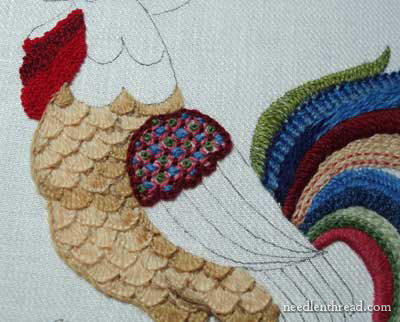For some time upon receiving Holy Communion, I have tried to focus on three things for which I am deeply grateful: the Divine Plan, the Blood of Christ, and Our Lady’s fiat. Each requires a moment to unpack and savor, beginning with this entire project we know as creation. I try to thank God the Father, its architect and prime mover—from the dawn of time until this very day. At times I feel as if I’m hanging by threads, wishing its twists and turns might allow it to unfold differently, but I’m confident that all will come aright—eventually. And what a marvel is Jesus’ own gift, his total oblation for love of me. He wants nothing more than for me to embrace that gift with both hands, so that my communion with him here on earth might culminate in an eternity of bliss, which far outweighs its cost—both his suffering and my own. And both the plan and the price hinged on Mary’s response to the divine invitation; her fiat gave flesh to the Son of God, sacrificed for our salvation and ever present to us at the altar.
More recently, though, I’ve added a fourth item for contemplation, which gives room for the Holy Spirit and acknowledges the historical reality that makes my reception of the sacraments possible. Between that Annunciation so long ago and each Holy Mass in the present have been countless lives of faith that brought the message forward. Over two millennia, there have been so many unknown people who have welcomed the Holy Spirit and worn themselves out for the Gospel, and I must give thanks for them as well. Just as every bishop has a genealogy—the long succession of men laying hands on men, who have in turn ordained others—every Christian has a genealogy. The difference is that ours is not nearly as crisp or well-documented!
It might help to imagine this genealogy-of-sorts as a [very!] long bolt of fabric, stretching from Pentecost to our own doorstep. If we picture a plain weave, like the long and sturdy fibers that create linen, we can distinguish its warp and weft. These are made of myriad prayers and sacrifices of countless people throughout the ages, as well as the institutions and cultural touchstones that nourished them over the centuries, everything from carved pulpits and beloved schools to unassuming hedgerows and quiet sewing circles. Confessionals were scattered from cathedrals to cots, and the God who takes flesh over marble altars never shunned a battlefield or tearstained pillow. Despite some portions being threadbare, patched, or ripped, other segments are embellished with beautiful stitches—ornate colors, interesting patterns, and inspired images. No two sections are alike!
To be sure, the mystery of grace is an extraordinary thing—with some chapters in any person’s life being more deeply rooted in faith than others. Indeed, for all those who found God late in life, there are others who knew him once and yet drifted from his abiding love. Thus, there are many within our own genealogy in both camps—each life a kaleidoscope of good and poor choices, meaning that the very Gospel for which we give thanks came through the hands of those who may still need our prayers. Indeed, the threads linking the generations are often delicate and loosely woven—secure in the mind of God yet awaiting the collaboration of future generations to tighten them into sturdier stuff.
This is simply another way of looking at the entire mystical body, the People of God—which includes those in heaven, those in purgatory, and those of us privileged to live at this time and embrace all the rest. The privilege we have of worshipping the living God has come through the prayers and actions of others, many of whom might still look to us to pray them into heaven, and the rest we can lean on in our own need. Once we have this image firmly in mind, and fully aware of our gifts and challenges, we’ll know how to enhance our piece of the tapestry so that those who follow will understand the divine plan as an opportunity for creative, life-giving love.

Recent Comments